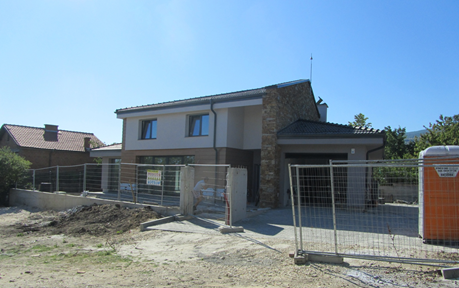A family’s dream home made more comfortable and energy efficient

Investor
Homeowner

Location
Belashtitsa, Bulgaria

Investment
Air to air heat pumps; underfloor heating and cooling; warm/cold air fan convectors; wireless control system; thermal insulation; doors and windows.

Investment Size
€ 23,000

Financial results
Payback of 20 years

Energy savings
1,470 kWh per year

CO2 savings
1,004 kg per year

Impact
Reduced energy bills; improved living comfort; better internal air quality; improved sound insulation.

Donor
KIDS Fund

A newly-built near zero-energy house sits perfectly in the woodlands by the Rodopi mountains
Dr. Zaimov’s built his new house in Bulgaria to a very high energy performance standards to reach a near zero-energy rating by investing green technologies.
Dr. Zaimov and his family lived in an apartment building located at the intersection of two of the busiest boulevards in the city of Plovdiv. This area is extremely noisy and polluted, so they decided to move to a quieter, more spacious and cleaner place at the foot of the Rodopi mountains, near the city of Plovdiv. Once they had the planning permission for the new house granted, they turned to the United Bulgarian Bank (UBB) for a consumer bridge loan. UBB directed them to the REECL consultants to discuss alternative financing options.
After the consultation, Dr. Zaimov decided to change their project design to make his home energy efficient and qualify for REECL financing.
The REECL consultants prepared energy models to guide the family to the least expensive measures required to create a high energy efficient and comfortable home; supported the family in choosing different energy efficient technologies to include in their home and assessing the benefits these technologies will bring to the family. The Kozloduy International Decommissioning Support Fund (KIDSF) supported the project by providing investment incentives and technical assistance.
As a result Dr. Zaimov received a REECL consumer loan, coupled with a sustainable energy investment incentive of 15% of the disbursed amount; the benefits of living in a near zero-energy home; and the technical assistance from the REECL Project Office were the key drivers to taking out a REECL loan.
Amongst the new technologies were renewable heat pump for heating, cooling and domestic hot water, coupled with underfloor heating/cooling and modern smart instrumentation and controls. To reduce the energy demand, the house envelope was built using enhanced thermal insulation, air/vapour barriers and airtight, high- efficiency doors and windows.
After spending a winter season in his new home, Dr. Zaimov reported that the energy bills for their new spacious and comfortable house were less than what they paid in the past for their flat in Plovdiv. He estimates that they might be saving around €200 – €400 a year on their energy bills, however, living in a more comfortable and spacious home.
The new house led to a reduction of the CO2 emissions by 1,004 kg per year, making a valuable input towards Bulgaria efforts to achieve emission targets.
Dr Zaimov noted that he was extremely happy for changing the initial project designs to make their dream house more energy efficient so that his family could enjoy high living comfort at minimal energy costs and minimal environmental impact.
REECL Facility in Bulgaria is part of the GEFF programme and was developed by the European Bank for Reconstruction and Development (EBRD) and is supported by the Kozloduy International Decommissioning Support Fund (KIDSF).



